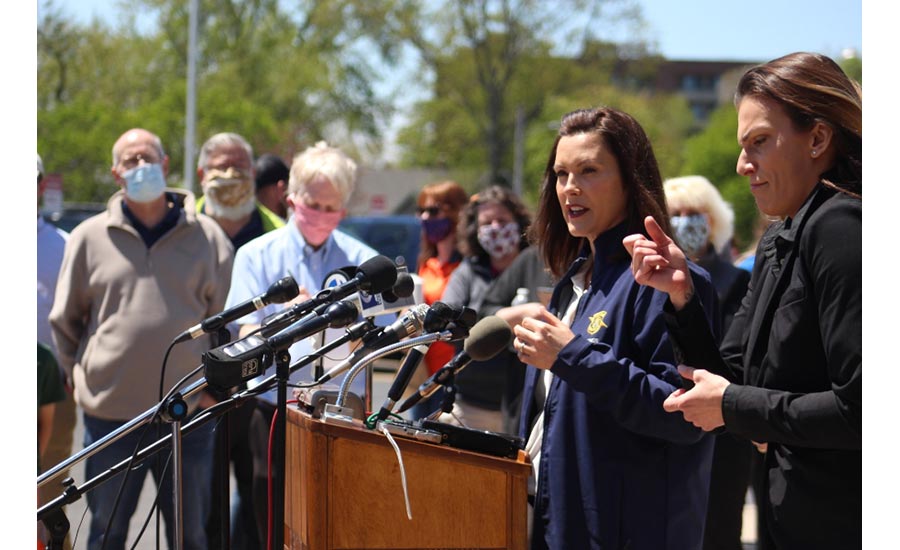COVID-19 and Construction
Associated Builders and Contractors Files Suit Against Michigan Governor's Orders
Michigan ABC Lawsuit Alleges Reopening Opens Contractors Up to Fines, Prison Without Due Process

The Associated Builders and Contractors of Greater Michigan filed a lawsuit May 21 in the Michigan Court of Claims against Gov. Gretchen Whitmer (D) alleging that Whitmer's executive orders 96 and 97 violate the state and U.S. constitutions and the Michigan Occupational Safety and Health Act. The suit also contends the executive orders open ABC of Greater Michigan's members up to $70,000 in fines and three years in prison for violations that were never established as law by the state legislature.
[For ENR’s latest coverage of the impacts of the COVID-19 pandemic, click here]
Businesses found to be in violation of order 96, which reopened Michigan to construction, can be unfairly disadvantaged under penalties outlined in order 97, according to the lawsuit. Both orders were issued by the governor's office May 21. The fines and penalties for violating orders issued under the governor's emergency powers carry a maximum penalty of 90 days in jail and/or a $500 fine, but order 97 allows enforcement by state agencies such as the Michigan Occupational Safety and Health Administration, which could allow for the larger penalties outlined in the lawsuit.
The lawsuit further alleges that, if the executive orders are allowed to stand, the state can fine businesses without providing due process because the order lowers the burden of proof from a legal standard “beyond a reasonable doubt," to the order's own standards. The order reads, "the rules described in sections 1 through 10 have the force and effect of regulations adopted by the departments and agencies with responsibility for overseeing compliance with workplace health-and-safety standards and are fully enforceable by such agencies. Any challenge to penalties imposed by a department or agency for violating any of the rules described in sections 1 through 10 of this order will proceed through the same administrative review process as any challenge to a penalty imposed by the department or agency for a violation of its rules."
There are nine rules outlined for construction companies in order 96. They include, "businesses or operations in the construction industry must restrict unnecessary movement between project sites" and "require the use of work gloves where appropriate to prevent skin contact with contaminated surfaces." ABC of Michigan's attorneys argue in the complaint that the terms such as "appropriate" and "necessary" are overly broad.
ABC of Greater Michigan was joined in the lawsuit by The Mackinac Center Legal Foundation in Midland and DJ's Landscaping and Lawn Service, a Grand Rapids-based landscaping contractor. The Mackinac Center generally takes on cases of what it considers government overreach. The plaintiffs are being represented by the Miller Johnson law firm of Grand Rapids.
"From our standpoint, this litigation was necessary," says Jimmy Greene, CEO of ABC Greater Michigan. "I certainly think clarity is necessary for these orders and for our more than 900 member contractors."
Greene says ABC of Greater Michigan would embrace new regulations that went through the state legislature, and it would provide input to any new rules meant to address the COVID-19 pandemic. He adds that enforcement of regulations should not be administered by appointees of the governor via administrative review.
"There are policing agencies across the country, OSHA, etc., that we work with, that our members work within and adhere to their guidelines regularly," Greene says. "Michigan’s more than 100,000 craft trades professionals deserve safety and certainty from state government as they return to their jobsites. They also deserve to have a voice in the rules process. Instead, they are threatened by the arbitrary, unclear and unconstitutional enforcement methods set to be dispatched throughout the state to intimidate good, honest workers.”
A spokesperson for the governor's office said it does not respond to ongoing litigation and would have no comment about the suit. When asked if trade groups such as ABC and the Associated General Contractors of America had input into the crafting of order 97, the spokesperson did not respond.




